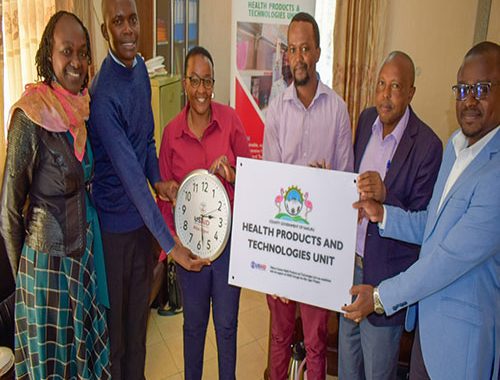A digital revolution has transformed health-care service delivery in Nakuru County, bringing in a new era of efficiency and openness.
Ms Roselyn Mungai, County Executive Committee Member (CECM) for Health Services, highlighted that the divided unit’s administration has implemented cutting-edge digital technologies in all health-care operations in order to leverage technology for better governance.
“From electronic health records to automated appointment scheduling, the county administration is successfully implementing digitised health systems that simplify patient care, record keeping on patients and availability of drug stocks and overall health care management,” highlighted by the county’s CECM.
Ms Mungai, who received computers, accessories and cabling from the United States Agency for International Development (USAID) Tujenge Jamii programme to support the ongoing digitisation of health service delivery in Nakuru, stated that paperless technology has not only increased medical practitioners efficiency but has also significantly improved patient experience.
“This contribution will enhance Governor Susan Kihika’s administration and commitment to enhance efficiency, improve data management and streamline service delivery across beneficiary health care facilities,” the CECM stated.
The CECM stated that real-time data access enables health professionals to make informed decisions quickly, resulting in more efficient health care delivery in all public hospitals.
She also stated that Nakuru County has started moving to an electronic Community Health Information System (eCHIS) to support community health promoters’ (CHPs) activities.
She claimed that over 2,000 CHPs will use the devices to help with household registration, patient screening, treatment and referrals, as well as to advocate for primary health practices.
The Electronic Community Health Information System (eCHIS) is a national project started by the Ministry of Health a year ago. It consists of a SmartHealth Mobile Phone application developed on Medic’s Community Health Toolkit platform.
The USAID Country Health Information Systems and Data Use (CHISU) program contributes to Kenya’s digital health transformation by enhancing and strengthening the technology, software and information systems used by the Ministry of Health and all health-care workers to provide more affordable, high-quality services.
This includes teaching healthcare personnel how to gather, analyse, and apply data using standardised, unified systems, allowing them to make data-driven decisions about enhancing patient care.
Ms Mungai realised that the analogue system was costly for the county government, making data susceptible and data might easily be destroyed. According to the official, the digitised method makes data submission simple, traceable and reliable.
With technology, patients at the grassroots level can connect virtually with healthcare providers, avoiding the costs and inconveniences associated with travel while also ensuring that accurate records are retained.
In order to improve speed of response, the county government uses the data gathered by the “Medical Social Work Service Register” system to create policies and take action, such as sending out alerts about illness outbreaks.
The CECM claims that the e-register helps doctors and healthcare administrators to conveniently handle medication, medical billing and appointment scheduling. It also supports the Kenya Health Information System (KHIS) register at the national and county levels. It also provides improved rules for insurance and healthcare programs.
Additionally, the Medical Social Work Service Register is an online database that provides sub-county-level statistics on disease burden by region and type. Similarly, there are medical magazine publications that are specialised and contain a wealth of information about different disease loads.
Technology is important for Kenya’s efforts to get universal health care, according to Ms. Mungai.
She stated that “one of the major milestones that will push Kenya and Africa firmly into the future will be technology.”
Residents were assured by Ms. Mungai that the digital health system was created to ensure the privacy and security of their data.
“The primary priority is privacy and we always make sure to follow the regulations set forth by the government, specifically the Data Protection Act. The patient is the main focus and grants permission to anybody who has access to their digital files.” The CECM stated.

